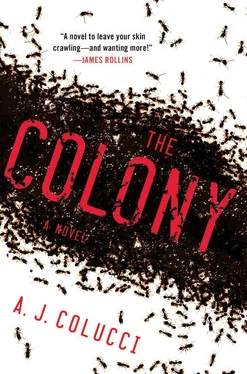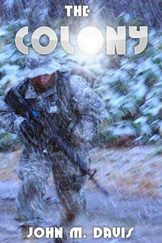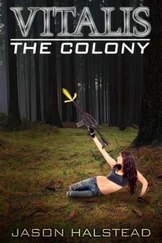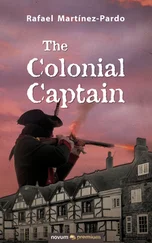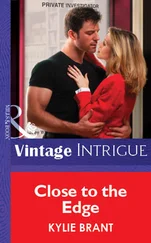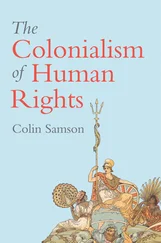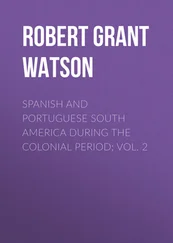On the wall was a large map of the borough. Garrett rose from his chair and pointed to evacuation sites. He explained, “If we begin bombing at seventeen hundred tomorrow, there will be approximately six thousand lives lost—those civilians too wounded or too incapacitated to make it out.”
He was actually talking about doing it, and his words swept panic over the room. Each set of terrified eyes shifted from one person to another. The smell of fear was erupting off bodies like steaming volcanoes, yet Garrett continued, unruffled, “There are going to be people we simply cannot reach. But everyone who is physically able will be flown or shipped out of the city, well outside range of any nuclear fallout. Right now we’re focusing on evacuation of the surrounding communities.”
“Let’s talk about that,” the president said. “Damage at the hypocenter, and the extent of nuclear fallout.”
This time Dawson walked over to a map of the Tri-state area, where colored rings showed a bull’s-eye that centered on Manhattan and radiated outward. He pointed to targets as he spoke. “We’re talking about dropping no more than four precision, extremely low yield neutron bombs. These are called Enhanced Radiation Warheads, meaning they produce a minimal blast and large amounts of radiation.
“Yes, we all know about clean bombs, ” said Hastings. “They leave the buildings standing and vaporize all the people. They’re the scariest motherfuckers on the planet, which is why they’ve been banned by every country, and why they’ve never even been tested.”
Dawson returned his focus to the president. “The W-70 has a one kiloton of explosive yield, confined to an area of only a few hundred yards in radius. However, it throws off a massive wave of neutron and gamma radiation, which will penetrate every building and the earth itself, destroying all living tissue. Taking into account the expected weather and wind velocity, we believe the fallout will be minimized, and certainly contained within the areas we’ve already evacuated. Any radioactive dust will be blown out to sea in a southeasterly direction, where it will dissipate rather quickly.
“These red areas are blast zones, absorbing forty percent of total energy and causing the most structural damage, so we plan to detonate the bombs over these four areas: Riverside Park, Washington Square, Central Park North and Central Park South. The orange areas depict the massive wave of radiation that will kill most if not all of the ants, while penetrating structures, ground surface, any place they might be nesting underground, and leaving most of the buildings intact. This blue area is the ionized and residual radiation, confined to Manhattan, although we’ll have to test some pockets of Queens, New Jersey and the Bronx. Within a generation,” he added, “Manhattan will be livable.”
“How do we even know this will work?” the president asked. “What if we nuke the city and the insects aren’t destroyed?”
“Exactly,” chimed in the majority leader. “Maybe it will even make them harder to kill. Doesn’t radiation do weird things to insects?”
“I believe you’re thinking of Godzilla,” chided the minority leader.
“You think this is funny?” scolded the president.
Dawson had dreaded this kind of thing. He told the group, “We know for a fact that radiation kills the ants.”
“I don’t believe this,” the New York senator gasped. “It’s a bloody nightmare beyond our wildest dreams. We’ll be the laughingstock of the world.”
“Correction,” cried Hastings. “Our military will be the laughingstock of the world, which I think is a fitting depiction, considering—”
“Just a moment,” Garrett interrupted. “Do you honestly believe that possession of the single most deadly weapon in the history of mankind is something to be ashamed of?”
“General, get that man out of this room!” Hastings cried.
“I apologize, sir,” Garrett said mildly. “This is no time to be congratulating ourselves.” His nerve returned with his voice. “However, you mentioned how we’ll look to other nations. Did you think about how we will look if we don’t do anything about these ants? I’ll tell you. Weak. Fearful. Easily strikable.”
Dawson knew this was coming. They had discussed it on the flight to Washington as their best line of defense. “The colonel is right. If other state leaders think these ants are out of control, that the insects are spreading across the planet, how long do you think it will be before they take matters into their own hands? And it won’t just be New York but all the surrounding states. There are nations just waiting for an excuse to blow us up. Surely, you all remember the global panic over the last pandemic. This is a thousand times worse.”
The room fell silent, everyone thinking the same thing, and Dawson knew he had won them over in fifteen minutes. He had given the president an out.
“So you’re saying,” the president said slowly, “if other countries insist we take care of the problem immediately, we’re defenseless to argue. It’s not in our hands.”
“I can guarantee you, there are heads of state preparing their own nuclear arsenal in the name of global security,” Dawson replied.
As he spoke, Garrett used a remote to turn on a television screen that began flashing photos of New York City victims, chewed to the bone, inside an abandoned city. It was the most startling testimony yet of what the entire country might face in just weeks. There was no doubt that stopping this heinous enemy warranted extreme measures.
Garrett added, “If you turn to page thirty-four of the reports in front of you, it’s clearly outlined that there is a zero percent chance of containing the ants if we wait twenty-four hours. That goes to ninety-eight percent if we hit them before nightfall.”
The president nodded thoughtfully. He would be phoning his closest allies in moments, Dawson was certain. If they were in agreement, he’d give the green light.
The attorney general had one last question, and his voice cracked over the silence. “What will we say to the rest of the world, after we drop the only neutron bomb in the history of mankind?”
The words rolled off the colonel’s tongue. “You’re welcome.”
There wasn’t a body not soaked in sweat. Heads were spinning and no doubt every person in the room wanted to run and hide in a closet. Dawson was asking for the unthinkable, and succeeding in convincing the powers that be that there was no other option.
In his mind, however, he was praying for one, and wondering if two scientists had found their queen.
* * *
General Dawson and Colonel Garrett left the Situation Room with a green light on Operation Colony Torch. Garrett was elated, bursting with pride at what he regarded as his own personal victory: setting the American military on a new course in history. However, Dawson felt sick to his stomach, and spoke not a word until they reached a military jeep waiting with a driver to take them to the Pentagon. He stopped and looked off into the distance, to a helicopter landing behind the White House.
“I’m going back to New York,” he told Garrett.
“What the hell for?”
“There are Americans who know nothing about this bombing, people in the city—our own soldiers—trying to help others get out.”
“A few thousand lost souls is not a great sacrifice considering—”
“Those are bogus numbers,” the general said. “Shit, Tom, do you think I’m an idiot? You may be able to fool those people in there, but I know there are a hell of a lot more casualties we’re facing. You’ll never get the military or the medical workers out on time. There are a hundred thousand wounded that need to be reached.”
Читать дальше
